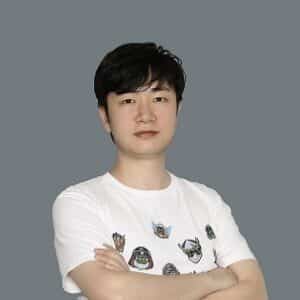This article is part of Virtuos Insider, a series of interviews where Virtuosi share about their careers and experiences in the company and video game industry at large. In this installment, Gan, an assistant art director at Virtuos Chengdu, shares how his love for video games evolved from a simple hobby to his lifelong career so far.
Gan is one of the veterans of the games industry, although he certainly never set out to be one. Once a college-goer stressing over his next move in life, his options ranged from medicine, to website administrator, to a life as a veterinarian. The last one was almost a reality, until his skills as an artist proved worthy enough to pave a road into game development.
Now an Assistant Art Director at Virtuos, Gan has over a decade’s worth of experience to bank on for projects involving next-gen systems and cutting-edge technology. He might not have much use for his skills in treating animals here, but we’re definitely glad he’s leading our teams on our next projects.
Being his usual candid and lighthearted self, he was more than happy to oblige when we reached out to him for a short chat this month. Check out the full interview below.

Please describe your career history in brief, leading up to your current position at Virtuos.
My first gig was at a very small studio, being the Archviz render guy there for 2 months. Afterwards, I moved to a local outsourcing company where I became an artist working on anything from 2D side-scrolling games to full-fledged 3D titles, mostly in a highly stylized art direction. This one lasted for 3 years.
My experience with stylized art gave me the opportunity to work on some really interesting stuff, including assets for Disney-related titles. By then, I had already joined up with Virtuos, where I progressed through a series of positions from Senior Artist, to Team Leader and Assistant Art Director.
All in all, I guess I’ve been in the games industry for over a decade, now.
What inspired you to join Virtuos in the first place?
I heard about Virtuos through an ex-colleague from my days at the local outsourcing company, who briefly mentioned in one of our chats that Virtuos was getting involved in next-gen projects. He didn’t mention any specifics, but that was already enough to spark some interest. One thing led to another, and before I knew it I was part of Virtuos.
Could you briefly describe your responsibilities as an Art Director for those of us who aren’t too familiar with the position?
Sure. Basically, it’s really about leading the art team through all phases of a given project. An art director is first responsible for understanding the client’s initial direction and clarifying that vision, before syncing up with the team through internal communications. They’re also supposed to decide on the best practices and how the project pipeline should look like for the team. In addition, they function as the middleman between the technical artists (TAs), production directors (PDs) and their own team, making sure that everyone’s on the same page.
Aside from the technical aspects, art directors should also be cheerleaders – inspiring the team, making creative suggestions, setting higher standards and giving direction to every team member.
What are some of the more high profile projects that you have worked on during your time at Virtuos? Was there anything memorable about your time working on them?
There’s a few of them that spring to mind immediately. The first one has got to be DiRT 2, which is the first time I had the chance to build a level all on my own. Then there was Rainbow Six, which was my first experience using Physically Based Rendering (PBR) and Substance Painter in a project.
I’m also exceptionally proud of my work on the Disney Infinity franchise; it was where I learned for the first time the true scope of a large-scale project, and how important artistic vision is for a highly stylized game.
Lastly, I had the great fortune to be a part of the development team for Watch Dogs 2, which essentially reshaped my understanding of AAA project management and cross studio collaboration. It’s turned out to be an important milestone in my career path.
There are a few more projects that I take great pride in, but those are top secret for now. Perhaps one day…!
What’s the biggest challenge at work for someone in your position?
Occasionally, a new, unfamiliar challenge may arise in a project that requires a skill or experience that you may not necessarily possess at that point in time. But you’ll still have to go through with it and make the best of things. The pressure to resolve that obstacle can be great, since the project’s success depends on it, but it still has to be done.
Do you have a personal example of this that you can share?
We actually had experienced one such example in one of our current projects. I can’t go into details, but this project required us to build complete levels within a uniquely-new framework. We didn’t have any experience with this framework before, but we did have level design experience from past projects, which we cherry-picked from and ‘ported’ to this one. It’s lucky that we had this edge, because we could fully concentrate on learning the fundamentals of the new framework first, while concurrently translating what we knew of level design as we went along.
There were quite a few stumbles on our journey, but we were eventually able to get the whole thing up and running smoothly. In retrospect, the learning curve is actually steeper than what we had predicted, but we did it nonetheless. To sum it up, the biggest challenge for someone in my position would be to strike a balance between pushing themselves and their team to their very limits, and remaining realistic of your capabilities.
Artists in the games industry can specialize in different areas, like how some Technical Artists are required to learn a bit of programming and how to use software tools. Are Art Directors expected to know a bit of everything across all specializations?
Yes. You don’t need to know every little process and detail across all disciplines, but you will need to have an understanding of their abilities and a surface-level knowledge of the theory behind how it’s done at least.
It sounds like this arrangement will need both the AD and the other artists to place trust in each other, since the artists may have a better understanding of their tools and processes that may not be easy to explain. What do you think of this statement?
Absolutely. Trust is essential, but it’s something that can only be nurtured over a long period of time.
It’s also true that the artists would possess a much better understanding of the tool they’re using, but I think it’s not enough to have them be the only ones capable of operating the tool; each AD must strive to gain at least a basic understanding of how the tool works to be on the safe side.

Tell us a bit about your personal life. How did you get exposed to technology and games?
I’ve never actually thought about this question before, but I suppose I was already into gaming way before I joined Virtuos, or even worked in the games industry.
There was one specific event I can remember that began my fascination with making games. One day, about 20 years ago, I was reading this magazine about computer software that came with a tip about importing/exporting Diablo save files from one computer to another using disks, which meant that I could play my characters on any system that had the game installed.
This was a stunning revelation and gave me a glimpse of how games can be changed in the backend to improve a player’s experience, but even though it’s probably a sign of things to come, I never gave serious thought about joining the games industry until much later in life.
So, you ever expected to work in the games industry, or wanted to do so?
No – I played a lot of games in college, but I was also dealing with the realities of life at the time. Back then, I was still trying to decide what I was going to do in future.
First on the list was studying medicine and becoming a doctor, but that required 2 more years of study which was too long for me. I also worked as a website editor on the side and briefly considered going full-time on it, but soon realized that the commitment would require more capital than I could afford to invest. Finally, I took a chance at Veterinary; I didn’t particularly love dealing with animal issues on a regular basis (especially those involving loose bowels) but I was resigned to have it be something I would do for the rest of my life. I even became somewhat competent at it after a while.
Thankfully, I managed to bank on my art skills and made the jump into the games industry a year before I graduated from school, and the rest is history.
Now that you’re finally in the games industry, what do you like to do to relax after work?
Ironically enough, I’ve been reconnecting with nature on my downtime. I’ve recently begun to spend more time with my cat, indulging her in games of hide and seek, feeding her and cutting her overgrown nails (hooray for vet experience). I’m perfectly happy to disconnect from my emails and just laze around with her away from work.

That sounds very relaxing. Is there anything you can tell us about life in Chengdu, and the interesting things to see/do there?
Well, I can tell you right away that the local hotpot is a must-have for anyone visiting Chengdu – don’t ever miss it. As for sights, the Chengdu Zoo should be at the top of anyone’s itinerary. There’s also the Chengdu Research Base of Giant Panda Breeding for anyone who can’t get enough of the pandas at the zoo.
In general, Chengdu is a city that fuses both technology and tradition in its culture, so there’s always something cool to see in every corner.
Let’s go back to the topic of gaming. Do you still have a favorite game, or a genre of games?
Gaming will never not be a part of my life. But like how a chef never eats a meal that he makes himself, I play games that I will never have a chance to work on. Stuff like Limbo, Kingdom Rush, King of Fighters (the arcade version) and World of Warcraft.
That’s quite an interesting mix, from indies to fighters and even an MMO. Which game have you spent the most time on since you started playing video games?
It’s definitely World of Warcraft; it practically consumed a full quarter of my college time and I still play it every now and then. I no longer spend that much time on it, but I’ve always enjoyed this special mix of emotions like familiarity, nostalgia and fondness whenever I jump back into Azeroth.
Is there anything you would like to say to anyone reading up about Virtuos?
Virtuos Chengdu is one of the most exciting places to be in terms of games and technology for the city. Not only can you stay up to date with the latest, cutting-edge developments in the games industry here, you’re also given enough space and the right amount of competition to learn and grow no matter your skill level. There’s nothing quite like Virtuos within Chengdu itself.

